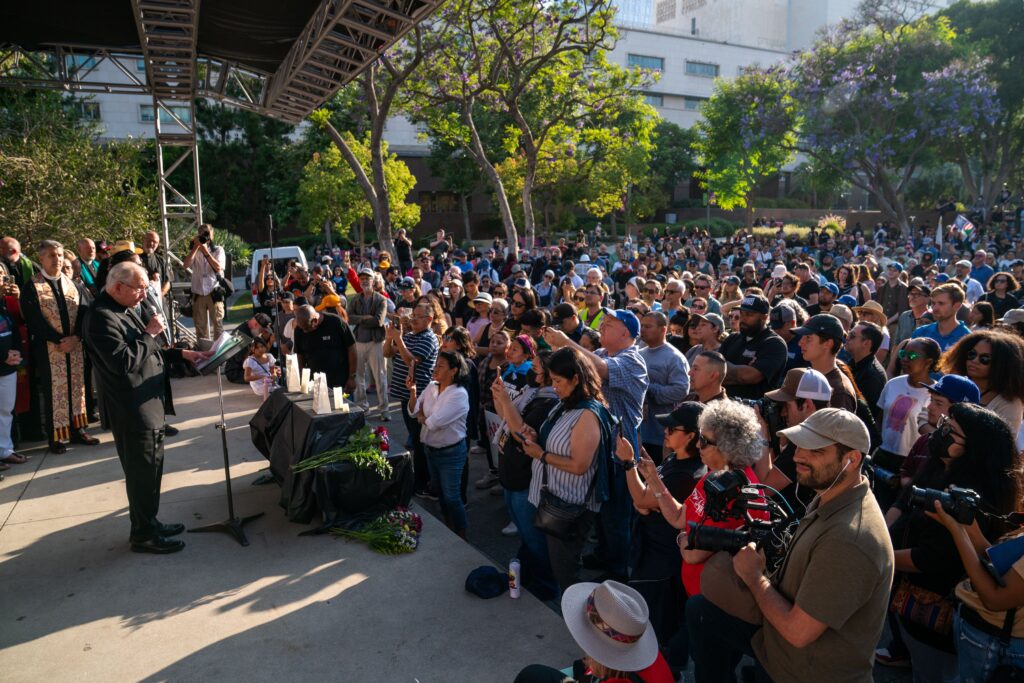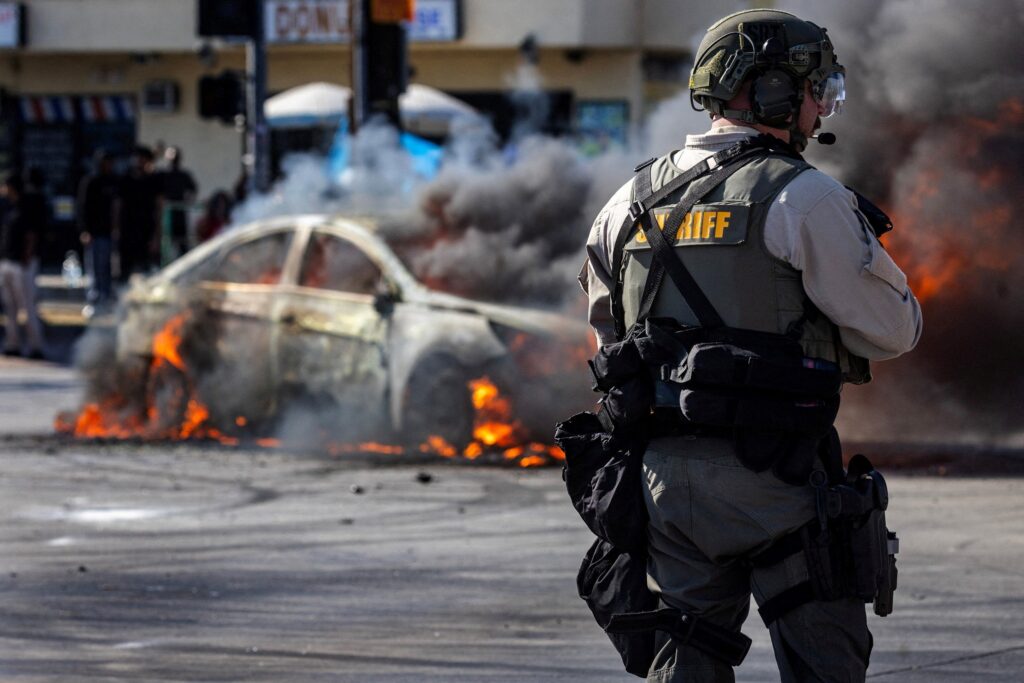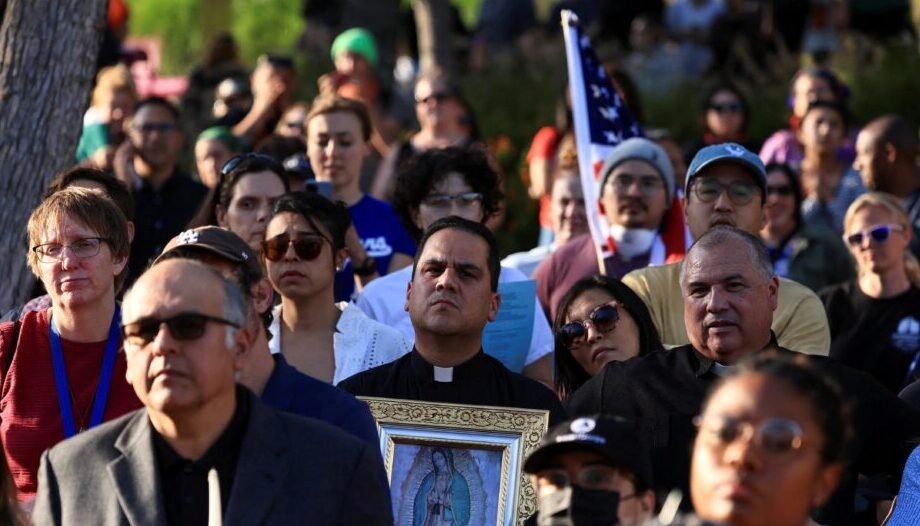Kimberley Heathetington, (OSV News)
Peacebuilding experts are discussing Catholic principles of nonviolent protest in the wake of events in Los Angeles and other cities.
Hundreds of people, including clergy from many denominations, leaders and supporters of faith advocacy groups and church congregants, were peaceful and respectful as they gathered near the Capitol on June 10 for a 'Pentecostal Witness for a Moral Budget."
However, they agitated by verbally urging Congress to protect Medicaid, SNAP food assistance benefits and other programs targeted by what they say are crippling cuts in the Trump administration's 'One Big Beautiful Bill' (H.R. 1), now under review in the U.S. Senate.
In defending the bill, House Speaker Mike Johnson, R-La., called it "misinformation" to claim that it involves drastic cuts to Medicaid (a federal and state health care program to help cover medical costs for needy individuals and families). Mike Johnson also assured that Medicaid coverage for people who need it is not threatened.
Non-violent protests
However, organizers of the vigil, including Georgetown University's Center for Faith and Justice, previously stated, "Withdrawing support from the nation's most vulnerable communities in order to cut taxes for the wealthy is a moral concession that followers of Jesus should not accept."
And what did they do? They demonstrated to protest. And, as people of faith, they did so non-violently.
It is an important precept of Catholic citizenship: ethical disagreement with public policies, and the desire to change them peacefully, is a worthy endeavor.
This contrasts with the violent clashes that have occurred recently across the United States - in Los Angeles, where 4,000 National Guard troops and 700 Marines have been deployed, in Minneapolis and New York. It has been a physical reaction by communities to Immigration and Customs Enforcement raids, which detain neighbors who are in the country without legal documents.
Archbishop Gomez: not to provoke fear and anxiety
The Archbishop of Los Angeles, José H. Gómezurged the restriction on June 9. "We all agree that we do not want undocumented immigrants who are known terrorists or violent criminals in our communities," Archbishop Gomez said. "But there is no need for the government to take action in a way that causes fear and anxiety among ordinary, hardworking immigrants and their families."
Protests that began on June 6 in relative calm have since escalated to scenes of burning cars, violent clashes with police and hundreds of arrests.
Meanwhile, officials, including California Governor Gavin Newsom and Los Angeles Mayor Karen Bass (Democrats), maintain that the chaos is limited to a small section of downtown.
"To live, speak and act without violence is not to give up, it is not to lose or give up anything," Pope Francis said in April 2023, "but to aspire to everything."
So how do you effectively encourage change in a culture that too often resorts to force, or ignores those who don't?

Catholic principles of nonviolence
OSV News spoke with peacebuilding experts to explore Catholic principles of nonviolent protest.
"If you're interested in joining a protest or demonstration," said Meghan J. Clark, professor of moral theology at St. John's University in Queens (N.Y.), "I would urge Catholics to prepare."
Clark wrote that "protest is not just a matter of justice, it is an act of faith." He now suggests preparedness in three key areas, especially for action related to immigration issues.
Meghan J. Clark: information, prayer and community
"First, information: make sure you learn and know about what is happening. It's also important to know what to take and what to leave at home," she advised. "Ignatian Solidarity Network and CLINIC (Catholic Legal Immigration Network Inc.) are perfect places to start. They offer a wealth of information, practical guides and narrative stories."
Clark then advised prayer. "Prayer, discernment and reflection are crucial in preparing to engage in active nonviolent protest. Dr. Martin Luther King, Jr.(a Christian Baptist minister), developed principles of active nonviolence that he would urge Catholics to use to prepare themselves spiritually," he said. "When we prepare ourselves spiritually, then it is easier to resist fear, intimidation and escalation in a tense situation."
And finally, community. "Participation in demonstrations is best done with others. Even if you don't know anyone else interested in going, when you join the demonstration, get to know your neighbors," Clark recommended. "By coming together to protest injustice, we create new moments of encounter and solidarity with each other."
Gerard Powers (Notre Dame): key role for Catholics
Gerard Powers, director of Catholic peacebuilding studies and coordinator of the Catholic Peacebuilding Network at the Kroc Institute for International Peace Studies at the University of Notre Dame, agreed.
Powers cited the crucial role Catholics have played in nonviolent protests, from People Power in the Philippines and Solidarity in Poland, to the 2003 Iraq War protests and the annual March for Life in Washington.
"To maintain moral standing and be effective, protests must remain nonviolent, organized and disciplined, and strategically focused on the injustice at issue," Powers explained. "If protests become random and associated, however unintentionally, with violence, they should cease, and alternative means of opposing injustice must be sought."
Strategy broader than protests
Nor can protests be the only tool of opposition. "Even effective nonviolent protests," Powers added, "have to be just one part of a much broader strategy to address injustice and promote the common good."
Judy Coode, communications director for Pax Christi USA, emphasized shared humanity and relationship building.
"When we join a public demonstration, as in any interaction with others, we recognize and respect the humanity of others, even if we disagree," Coode said. "When we choose to respond with nonviolence, we are choosing to build relationships and understand others, and we are focused on ending injustice, not defeating a person or persons."
Judy Coode: preparation
Like Clark, Coode also urged preparedness. "In the Gospels, Jesus repeatedly teaches us to choose nonviolence, and that is why we are committed to nonviolence," confirmed the Pax Christi USA director.
"All people who hope to participate in public demonstrations in support of the common good - Catholics, people of other religions, those who do not claim a faith - are strongly encouraged to learn more and train in nonviolence. A nonviolence that has a deep and rich history, but is too often dismissed. But if more and more people understand its efficacy and how it has been effective over the years," he added, "it will become more and more widespread."

Right to protest peacefully
All three experts had strong words to say about the events in Los Angeles. Clark was concerned about the militarized intervention. "Such an unwarranted escalation makes the community less safe, not more," he said. "The right to peacefully protest is essential in any democratic society." The powers urged focus.
"The violence associated with the Los Angeles protests is illegitimate and counterproductive and must be addressed," he confirmed. "But we cannot let that distract us from the main issues at stake here: the Trump administration's unfair immigration policies, its harsh efforts to stifle legitimate protests on a range of issues, and its moves to militarize domestic law enforcement."
Coode said Pax Christi USA is "deeply concerned about the federal government's attempts to intimidate vulnerable and marginalized people, and are appalled by the unjustified and disproportionate use of force in the Los Angeles area." Speaking in North Carolina on June 10, President Donald Trump warned that future immigration protests could be "met with equal or greater force."
"Faithful to the principles of our Catholic social tradition."
Back in Washington, Adam Russell Taylor, Baptist minister and president of Sojourners, made a promise to the "Moral Budget Watch" participants, "Let's make some holy noise today, shall we?"
Taylor was followed by dozens of speakers, some with a prophetic word; others offering pertinent Scripture verses, occasionally punctuated by hymns.
Before heading to the steps of the U.S. Capitol, where participants were joined by Senators Raphael Warnock, D-Georgia, and Chris Coons, D-Delaware, Joan F. Neal, interim executive director of Network, a Catholic social justice lobbying group, spoke.
Joan F. Neal echoed the concerns of the U.S. Conference of Catholic Bishops, which on May 20 called the provisions of H.R.1 "unconscionable and unacceptable."
"We already know that this bill will hurt families, children, seniors, our immigrant brothers and sisters," Neal said. Also, he noted that "it will be the largest transfer of wealth from those with the lowest incomes to those with the highest incomes in the history of our country."
Act of faith and hope
Neal then addressed the Catholic members of the Senate "to remain true to our faith values and the principles of our Catholic social tradition."
The event was, in essence, a model of faithful nonviolent protest, a group of leaders acting peacefully, like what St. Oscar Romero described as "a microphone for Christ."
While the impact is uncertain, optimism was in the air, and underscored a comment by Clark. "Active nonviolent resistance," he observed, "is a profound act of faith and hope."
Climate of violence: recent murders
As context, it is worth noting that violence with a political profile, not only that which has to do with immigration policies, is taking up more and more space in American life. Recently, there has been an attack against two Democratic legislators in Minnesotain which a state congresswoman and her husband were killed, and a senator and his wife were seriously injured.
The events have been condemned by the entire political spectrum, including President Donald Trump, who in July last year, in the midst of the election campaign, had an attack in Pennsylvania, which could have cost him his life.
On the other hand, American universities were the scene of violent protests last year against the war in Gaza. Leo XIVThe first American pope, he has prayed for and promoted peace since the first day of his election as the Successor of Peter in May.
—————–
Kimberley Heatherington writes for OSV News from Virginia, USA.
This article is a translation of the original from OSV News which you can find at here.
—————–








